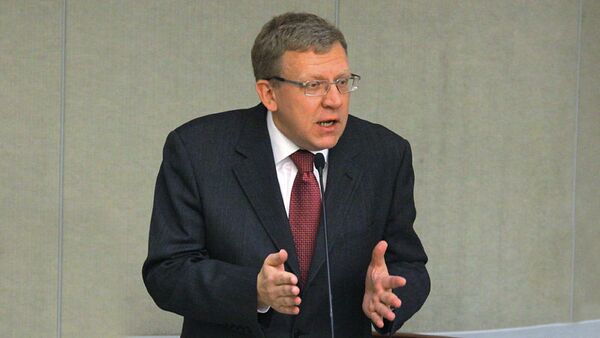In open defiance of Moscow’s highly choreographed power shift, finance minister Alexei Kudrin said he would not work in a cabinet led by Dmitry Medvedev.
With the Kremlin set to pass the baton of leadership back to Prime Minister Vladimir Putin next year, Alexei Kudrin, the man widely credited with effectively managing Russia's financial resources through thick and thin, has ruled himself out of playing any role in Russia's next government. The long-serving finance minister made the unexpected announcement on Saturday in Washington, where he has been attending a bi-annual meeting of the Intentional Monetary Fund and World Bank.
Kudrin’s comments came after Russian President Dmitry Medvedev announced at the convention of the ruling United Russia party on Saturday that he would step aside for Putin to reclaim the presidency, and take Putin's place as prime minister after presidential elections in March.
In what observers call a rebellious move, the finance minister stressed that he does not see himself as part of a future Russian government, adding that Medvedev's policies carried "significant budget and macroeconomic risks" for the country. "I do not see myself in a new government," Kudrin told reporters. "The point is not that nobody has offered me the job; I think that the disagreements I have will not allow me to join this government." Kudrin further said he would “definitely turn down” any offer to join Medvedev’s cabinet.
Why would a reformist finance minister consider himself such a misfit in a cabinet due to be headed by reform-leaning Medvedev? Kudrin’s argument so far appears to be that Medvedev’s premiership will follow through on pre-election promises and double down on fiscal policies that are bound to put Russia in desperate financial straits.
Kudrin said the government’s decision to increase defense contracts and military retirement benefits as well as supply high-tech military equipment to Russia's military-industrial complex will together raise budget spending by 1.3 percent of the gross domestic product in the next fiscal year. Taking the expected increase in military spending in the coming years into account, he said, spending would reach three percent of the GDP by 2014. "Three percent of GDP is roughly 2.1 trillion rubles in 2014," Kudrin said. "And this is what is spent on the entire education system, including all high schools, all secondary schools [and] all specialized institutions.”
An old Putin colleague and trusted ally, Kudrin was appointed finance minister in May of 2000, just a few months after Putin became president. For many years, he remained one of the few liberals in then-president Putin’s – and later premier Putin’s – government. Though outwardly soft-spoken, Kremlin insiders said that Kudrin, along with former Economic Minister German Gref, were the only federal ministers who could hold their ground before the powerful Russian prime minister during policy debates. Kudrin is widely revered even by his critics for his prudent fiscal management, commitment to tax and budget reform and for championing free market values. It was his decision to keep Russia’s oil windfall in a reserve fund, rather than spend it on infrastructure or social projects, which has helped the country weather the global economic crisis and cover its budget deficit.
Barely two weeks ago, Kudrin told the Reuters Russia Investment Summit that he was prepared to remain in the government in any role after the 2012 elections to push through economic reforms. Many have interpreted his comments as a declaration of intention to take the seat of the premier after the 2012 elections. Kudrin did say then that he was willing to remain in the government only if serious reforms were being pushed through. Kudrin also warned that after parliamentary and presidential elections in the next few months, Russia would have to reform the country’s pension system to put the program on a sustainable footing, and find a way to finance big increases in defense spending. The hike in defense spending, he said, would make it difficult to cut the deficit amid rising global oil prices. “It will maintain our dependence on oil," Kudrin said, adding that such dependence is "risky" for the economy. In a whiff of exasperation, Kudrin said that despite discussions on the issue, a decision has been made and incorporated in Russia's three-year budget.
Russia’s highly-hyped pension reform, which began in 2008, has largely failed despite three years of efforts, Kudrin said on Saturday. The state's pension fund will run over one trillion rubles in deficit next year, Kudrin said. That shows that “the reform is not over and cannot be considered successful,” Kudrin said, adding that an important feature of a successful pension system is long-term [fiscal] balance that could deliver sustainable support for pensioners. The finance minister repeated his call on the government to raise the pension age to maintain respectable levels of compensation for retirees. “We are speaking about a shortage of funds to pay pensions. Increasing the pension age decreases such risks,” he said. In the past, such calls have put him in direct conflict with many in Russia’s ruling party. Last year, Andrei Isayev, United Russia's first deputy secretary of the presidium, said Kudrin's "fatal insistence" in advocating an increase in the pension age amounted to "an active play against the party” and is "causing outrage in the electorate."
The views expressed in this article are the author's and do not necessarily represent those of RIA Novosti.



